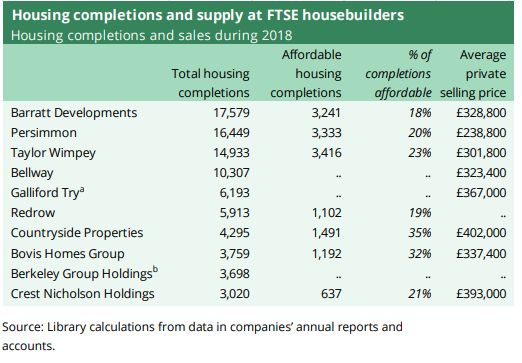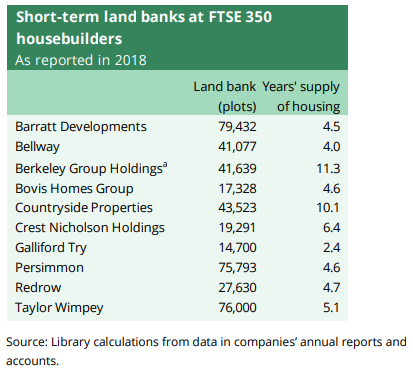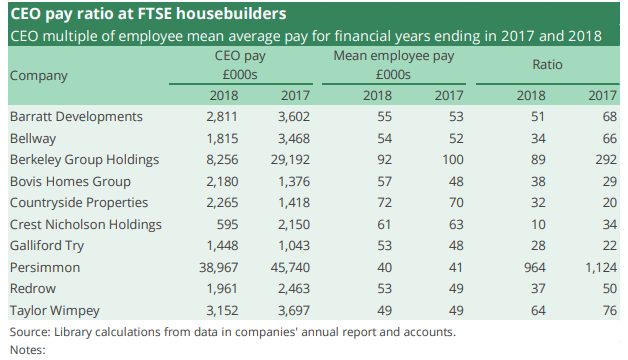British Housebuilding Industry – House of Commons Debate

On Thursday (5th September 2019) the House of Commons was subject of a Backbench debate on the British housebuilding industry.
Called by Siobhain McDonagh, Labour MP for Mitcham and Morden, a background of housing supply, affordability and homelessness was presented to MPs. Thereafter, a detailed expose of the10 housebuilders in the FTSE 350 index was highlighted, concentrating heavily on the 4 housebuilders who are also in the FTSE 100 index. Matters such as landbanks, Chief Executive pay/bonuses, housing completions, and affordable housing provision were discussed.
Siobhain McDonagh MP opened the debate by looking at the current housing crisis, the record of the FTSE 350 companies and their contribution to solving this crisis. Pay inequality issues which she believes are rife across the industry were also raised.
Housing completions and supply at FTSE housebuilders

Source: Debate on a motion on the British housebuilding industry, page 5 – download PDF
The MP bemoaned the fact that between 2017 and 2018 only 6,464 new social homes were built, the second-lowest on record and referred back to the 1950s and 1960s when 150,000 and 203,000 council homes were delivered by Governments. With a current target of 300,000 new builds a year which has not yet been reached she focused on the 4 housebuilding companies who are in the FTSE 100 index, Barratt, Persimmon, Taylor Wimpey and Berkeley. She highlighted Persimmon who had completed 16,449 homes and posted profits of £1.1 billion, half of which were subsidy through the Government’s Help to Buy scheme. Overall, she stated that together, these 4 companies collected a pre-tax profit of £3.68 billion despite completing only 53,198 homes, less than 18% of the Government’s build target.
Short-term land banks at FTSE 350 housebuilders

Source: Debate on a motion on the British housebuilding industry, page 7 – download PDF
The question was then posed that maybe volume housebuilders could not build out due to lack of developable land. This then turned to land banking with the extent to which the 10 housebuilders did this.
Several studies have considered whether land banking takes place. For example, a report by
Molior for the London Mayor in 2012 found that of the 210,000 existing planning permissions
for new homes in London, 55% were in the control of building firms while 45% were in the
control of non-building firms such as investment funds, historic landowners, government and
‘developers’ who do not build. Molior concluded that accusations of land banking directed at
builders were ‘misplaced.’ An updated report in 2014 found a smaller percentage of planning permissions held by non-developers.
It is acknowledged that developers retain stocks of land with planning permission as a strategy for managing pipelines and ‘smoothing out peaks and troughs in resource allocation.’ There are also holdings of ‘strategic land banks’ which are sites without planning permission which is generally held ‘under option,’ i.e. not recorded as in the developer’s ownership. Shelter and KPMG conclude that incentives to get strategic land through planning are “very high.” The MP highlighted that these 10 companies had a collective land bank of 470,068 yet only completed 86,685 homes between them.
If land banking is not the main problem, there does appear to be a case for ensuring that most of the suitable land for development is held by firms who intend to build on it.
Pay made to Chief Executives and ratios to staff employed in their firm was also a focus drawing on research from the High Pay Centre.
CEO pay ratio at FTSE housebuilders

Source: Debate on a motion on the British housebuilding industry, page 9 – download PDF
Whilst it was stated that it is in no doubt the CEOs worked hard, particular attention was paid to
Persimmon who after a Dispatches investigation and their then Chief Executive refusing, when on camera, to answer questions, had already been in the spotlight. MPs felt it wrong for Jeff Fairburn to be awarded a £75 million bonus despite, in their view, a substandard number of homes being built. In addition, it was highlighted that the median pay for an FTSE 100 house building CEOs is 228 times that of the typical worker, with Persimmon soaring to 964.
In terms of town planning, matters were raised but not extensively discussed during the debate,
these focused on:
– In Siohban McDongh MPs view (and experience at Connect House on a south London industrial
estate) the use of Permitted Development rights to convert office buildings into residential
resulting in poor living quality conditions
– The use of viability assessments at the planning application stage to lessen or not produce any
affordable housing when viewed against policy – the practice should be investigated
– Making it easier for self-build homes to be constructed for both market and social tenure. Here it was alleged by Richard Bacon MP that for
– Calls for further debate on the Town Planning system generally, Help to Buy, planning law and
building on the Green Belt Unsurprisingly, MPs highlighted particular constituency matters which practically leant weight to their arguments:
– George Howarth MP referred to a development in Summerhill Park which has had ongoing
leasehold issues. When trying to meet to discuss, the MP informed the house that Redrow
Homes refused to and referred to Redrow as “arrogant.”
– Mark Francois MP referred to 3 housebuilders working in close proximity to each other in
Rayleigh each having contra-flow traffic lanes. When the schools went back last week, this
resulted in gridlock. When the MP contacted all 3 to seek resolution he found the smallest,
Silver City finished works within a week, Countryside shutting the lanes in the rush hours with
Barratt David Wilson offering him a wholly unsatisfactory response. Criticism was levelled at
the Highways authority for not anticipating the cumulative impact
– Many MPs lamented the 30% loss of SME housebuilders during the recession and wished to put matters in train to assist them in “standing up” to the 10 volume housebuilders subject of this debate. Here it was alleged by Richard Bacon MP that for SMEs “It is a very risky enterprise, and actually local planning authorities prefer dealing with a small number of large companies because it is easier for them.
There was little time left for the debate to seek the views of Shadow and Government Ministers:
– The Shadow housing Minister reeled off statistics to try to prove the Government were not
delivering and pointed to Labours plans if elected to sort this
– The Minister, Esther McVay, also did the usual political numbers scoring, “300,000 new homes
by the mid-2020s” and political acceptance, “the market is not working” and “there are not
enough homes built.” It appears the only “new” thing she stated was establishing a new
“Centre for Excellence” in the north for construction and housebuilding. Not much else was said
A short parting shot from Siobhan McDonagh MP was to seek clarity when discussing affordable housing:
“I want to ask that we ban the word “affordable” in the context of housing. “Affordable” means 80% of market rent, but the vast proportion of our constituents could never afford 80% of market rent. Let us talk about social housing rent and owner-occupation, but let us also clearly address the question of what is affordable, because the “affordable housing” is not affordable.”
A question was then put and agreed by the House. They resolved:
“That this House notes with concern the ongoing shortage of housing and the housing crisis across England; further notes with concern the number of families in temporary accommodation and the number of people rough sleeping; acknowledges that there are over one million households on housing waiting lists; recognises the Government’s target to build 300,000 new homes each year; acknowledges that this target has been missed in each year that the Government has been in office and that the number of homes constructed by housebuilding companies that are deemed affordable is insufficient; notes the pay ratios between executives and employees in FTSE 350 housebuilding companies; and calls on the Government to tackle the housing crisis as an urgent priority.”
For reference:
– House of Commons Research Briefing Paper …
https://researchbriefings.parliament.uk/ResearchBriefing/Summary/CDP-2019-0205
– Hansard transcript details … https://hansard.parliament.uk/commons/2019-09-
05/debates/40C1B81A-B890-47D4-BE94-F2B12444A20D/BritishHouseBuildingIndustry
– Parliament TV coverage of the debate … https://parliamentlive.tv/Event/Index/de8c2a28-4dd2-
47e5-9283-7411a0abff01 Debate commences at 1545.
If you wish to discuss any of the topics in our blog articles, contact us today.





